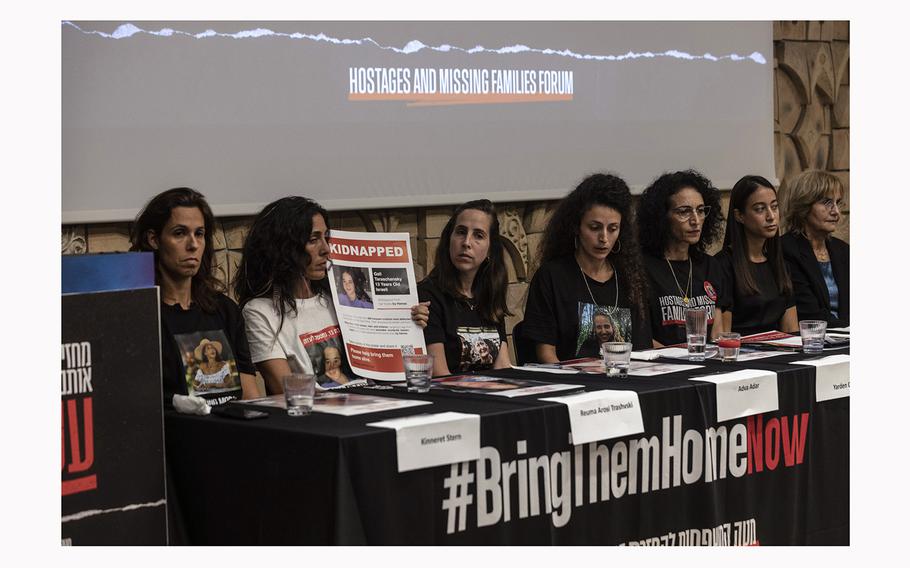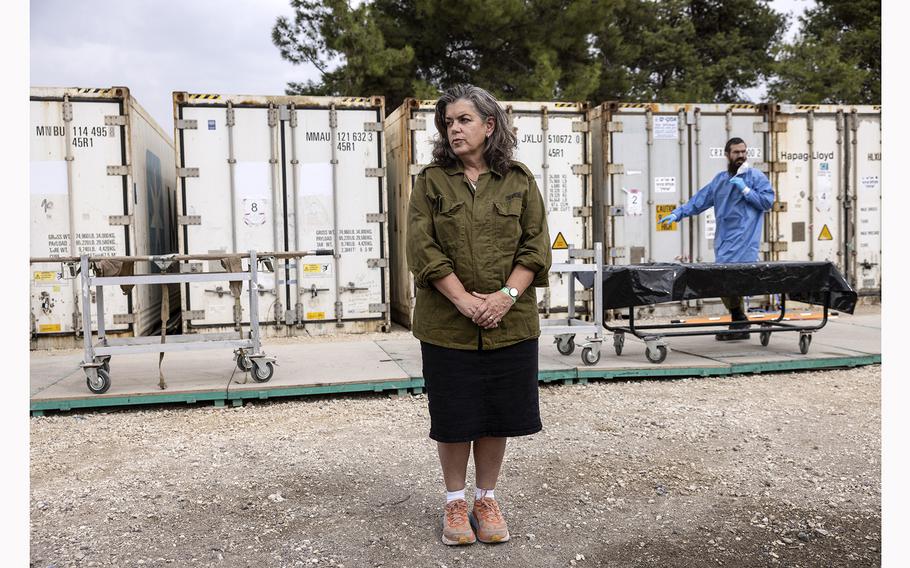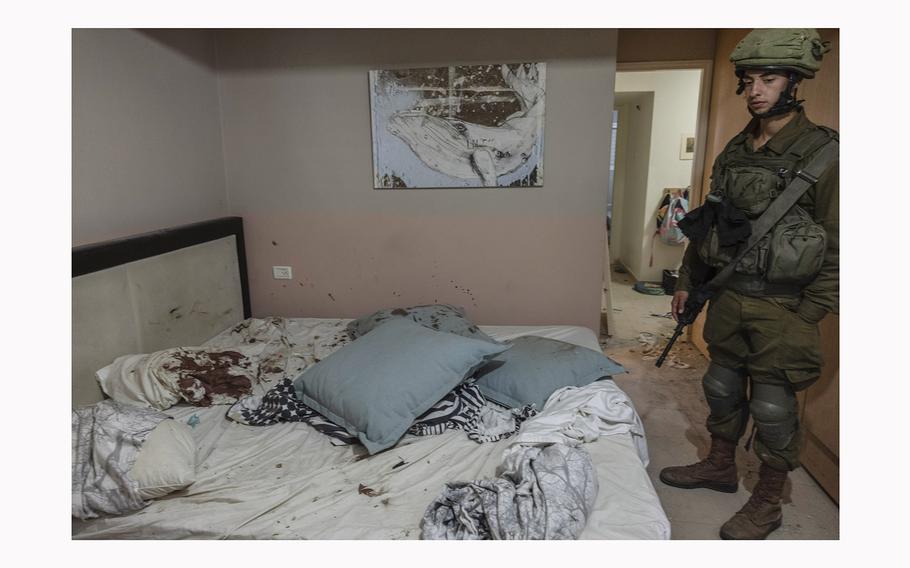
Reuma Tarshansky holds a poster showing Gali, 13, who was kidnapped from her home in Kibbutz Be'eri, as she sits with family members held hostage in Gaza during a conference in Tel Aviv on Nov. 13, 2023. (Heidi Levine for The Washington Post)
Warning: The following report includes graphic descriptions of sexual violence.
TEL AVIV - The first indications of possible sexual violence came as early as Oct. 7, the day that thousands of Hamas and other fighters streamed into Israeli towns and began live-streaming bloodshed and torture.
Footage showed several women stripped of their clothing. One video showed a woman, her hands zip-tied behind her back, with blood on the crotch of her pants.
Later came testimony from witnesses and first responders. One witness described in graphic detail a gang rape at the Nova rave site near Re’im. An Israeli reserve combat paramedic told The Post that he found the bodies of teenage girls with signs of sexual assault.
Combatants from Gaza overran 22 Israeli communities, killed at least 1,200 and took 240 hostage in the surprise attack. But their greater goal, sexual trauma specialists say, was to introduce terror against women - and children and other unarmed civilians - as a means of spreading fear.
“The torture of women was weaponized to destroy communities, to destroy a people, to destroy a nation,” said Cochav Elkayam Levy, the head of a nongovernmental commission investigating crimes perpetrated against women and children Oct. 7.
Hamas denies that its fighters use rape or assault against women as a weapon of war. To do so, Hamas official Basem Naim said, would go against its founding Islamic principles. The group, he said, considers “any sexual relationship or activity outside of marriage to be completely haram” - forbidden by Islam.
“Whoever does this kind of act is committing a major infraction and would be punished both legally and on Judgment Day,” he told The Washington Post. “So our soldiers would not go close to this forbidden” act.
Earlier this month, Moussa Abu Marzouk, Deputy Chairman of the Hamas Political Bureau based in Qatar, also said in an interview with the BBC that “women, children and civilians were exempt” from Hamas’s attacks - despite a death toll that was made up mostly of those groups.
The Israeli commission, established by Elkayam-Levy, is working to compile a comprehensive database of the assault that day, based on the testimonies of survivors, witnesses, medical examiners, first responders, police and militants themselves, many of whom participated first from behind the camera, as they recorded their actions, and later in front of the camera, as they were interrogated by Israeli security forces.
That’s in addition to the investigation by Israel’s police in coordination with the military and Shin Beit, the internal security service. The agencies have been building a case on charges of mass murder, rape, torture and bodily mutilation.
Authorities invited journalists this month to view a video compilation that drew from at least 60,000 clips and more than 1,000 witness statements.
“There was humiliation through rape on the morning of Oct. 7,” Israeli Police Chief Kobi Shabtai said.
“There was worse evidence that we were not able to show,” he said. “They cut limbs ... they raped, they abused corpses. There were sadistic sexual acts.” It’s unclear whether authorities have accounts directly from rape survivors.
Israel has experience and training in mass casualty events, but never before on the scale of Oct. 7, the bloodiest day in the country’s history.

A volunteer with Israel's military rabbinate who helped prepare remains of women killed by fighters from Gaza on Oct. 7 stands near refrigerated containers that hold bodies, body parts and ashes at a makeshift morgue for soldiers on the Shura military base near Ramla on Oct. 29, 2023. (Heidi Levine for The Washington Post)
Israel is not a member of the International Criminal Court (ICC), and Israeli authorities have not said whether they intend to prosecute Hamas militants for war crimes. Prime Minister Benjamin Netanyahu has repeatedly condemned ICC investigations of war crimes allegedly perpetrated by Israeli and Palestinian forces in the occupied Palestinian territories.
Some forces in the Middle East, including those of Syrian President Bashar al-Assad and the Islamic State, have used systematic rape as a weapon. But many armed groups consider the act taboo, even in war. The practice has never been used systematically in the Israeli-Palestinian conflict, according to experts.
Naim, the Hamas official, said the group’s fighters “did not commit any infraction that related to harassment or rape.”
“We affirm that all these Israeli claims are inaccurate,” he said.
The mission to identify and document rape and gender-based violence has been a grassroots effort, focusing on providing care to witnesses and survivors while also recognizing what specialists say is the possibility that most or all of the victims were killed.
The country’s several dozen sexual trauma specialists have been meeting with female survivors of Oct. 7 in clinics or in the hotels where the women are long-term guests, unable to return to damaged or destroyed homes in what is now a designated military zone.
The specialists have been hosting webinars, studying rape as a weapon of war in places such as Ukraine or Bosnia and communicating with other professionals in the field. They are sharing information on things like eye movement desensitization and reprocessing, prolonged exposure therapy and cognitive behavioral therapy (CBT) to help women begin to take control over traumatic memories, created under fire and likely processed erratically in the following weeks, as the war raged on and hostages, including survivors’ loved ones, remained in captivity in Gaza.
The specialists advise against asking a person whether they were raped. Instead, it’s important to let them know that they’re not alone. One might say: “There have been reports of sexual violence. Is it possible you know something about it?”
“You throw out a thread and see if they take it,” said sexual trauma clinic director Inbal Brenner, the assistant director of Lev-Hasharon Mental Health Center in central Israel. Mental health care providers, many of whom were traumatized, too, are grappling with the challenges of Oct. 7, which compounded sexual violence with a kind of namelessness, she said.
“There’s always dehumanization in rape,” she said. “But here it’s also nationalistic, which is very difficult to measure.”
The commission isn’t necessarily encouraging survivors to report their assaults to police. Telling the facts of their experiences to investigators in offices for the record could clash with the primary goal of returning a sense of control or a sense of self.
One woman, her face blurred and her identity concealed in a video statement to police, said she saw a gang rape at the Nova rave near Re’im during the Oct. 7 attack, as she lay down, pretending to be dead.

An Israeli soldier looks at a bed stained with blood in a home at Kibbutz Be'eri near the Gaza border where people were killed on Oct. 7, 2023. (Heidi Levine for The Washington Post)
The witness saw a woman bleeding from the back, she said, first bent over, then pulled back up by combatants. One man pulled the woman’s long hair and raped her, the witness said, then passed her onto another man, who also raped her before shooting her in the head.
“He didn’t pick up his pants,” the witness said. “He shot her while inside her.”
Survivors and witnesses have been reluctant to come forward, specialists say.
“There is always underreporting in sexual violence,” said Orit Sulitzeanu, who runs the Association of Rape Crisis Centers, based in Tel Aviv. “But with war crimes we know there will be extreme underreporting.”
Under those conditions, first responders and morgue workers have become a key source of information.
“We saw many women with bloody underwear, with broken bones, broken legs, broken pelvises,” said Shari, a volunteer worker at the Shura military morgue. She spoke on the condition that her last name be withheld to discuss the sensitive issue.
An Israeli reserve combat paramedic who spoke on the condition of anonymity to comply with military protocol told The Post that he found the bodies of two teenage girls in their bedroom with indications of sexual assault.
“One was on the bed. Her arm was dangling from the bed frame. Her legs were bare with bruises, and she had a bullet hole in the chest-neck area,” he said. “The other was lying on the floor, on her stomach, her legs spread and her pants pulled down toward her knees. There was a liquid on her back that looked like semen. She was shot in the back of the head.”
Devorah Bauman, a gynecologist, said women sometimes provide testimony indirectly - saying, for example, “that they heard there was rape in a neighbor’s house, or that there was an adolescent who was raped in front of her grandmother, in a nearby house. They are speaking indirectly, but I am not sure that it didn’t happen to them.”
Bauman is director of the Bet Ami Center, which treats rape survivors at Hadassah Hospital in Jerusalem. She’s helping to prepare hospitals to receive women and possibly men if and when they come forward. They could include hostages now held in Gaza by Hamas and other groups. Ninety of the approximately 240 hostages taken from Israel on Oct. 7 are women or girls.
Kinneret Stern’s cousin sold jewelry at the Nova rave, and was among the people kidnapped. As the family searched for her, they were shown a video of the woman, posted apparently by her captors, in a ditch and begging for her life.
“This is one of the Jewish dogs,” a man says. “Any man here will see what we will do to her, and we are here in the field.”
The “video implies the nightmare that every woman is afraid of, of not being able to defend her own body,” Stern said. “It’s an issue that we dare not even say out loud.”
Sarah Dadouch in Beirut and Lior Soroka in Tel Aviv contributed to this report.